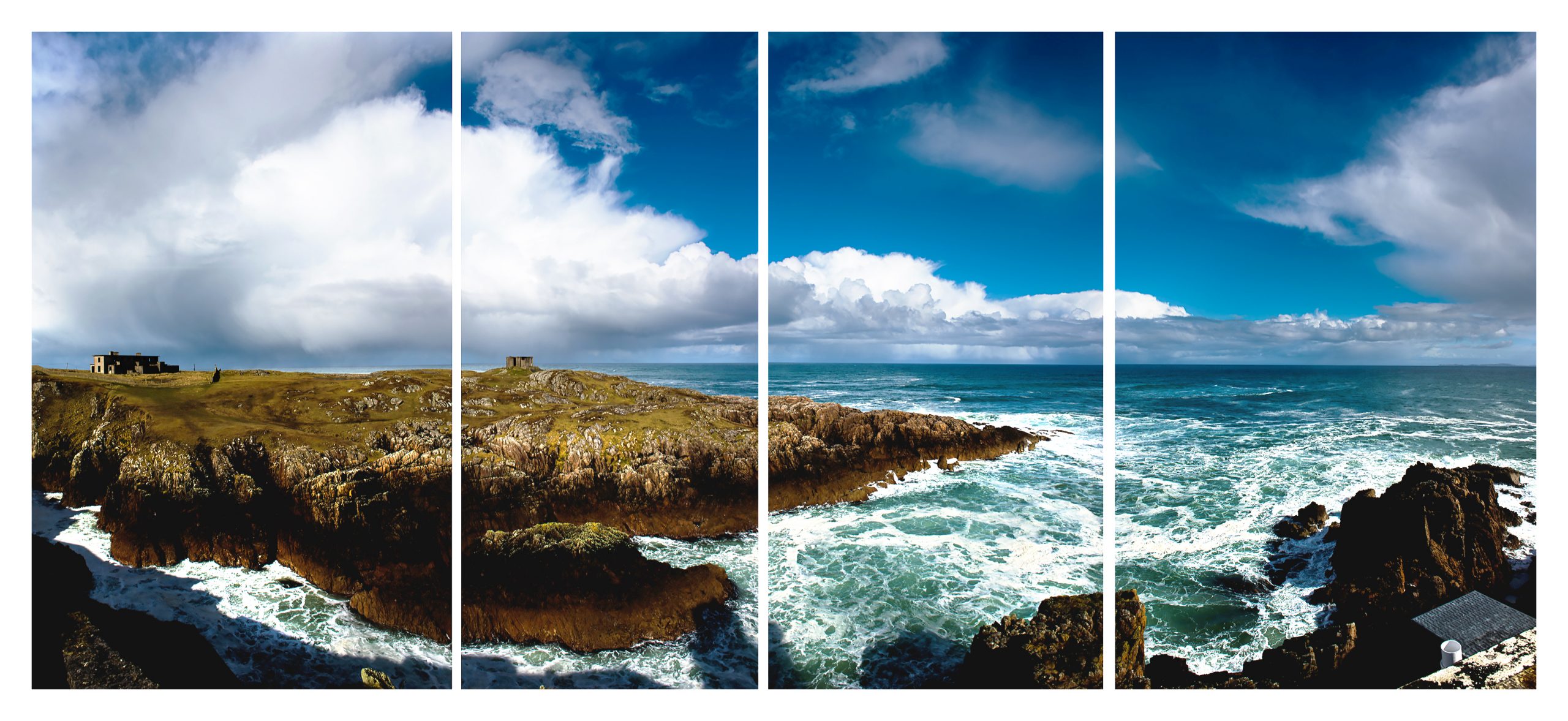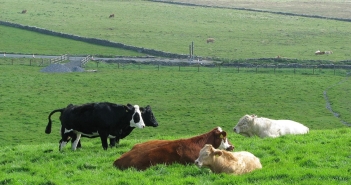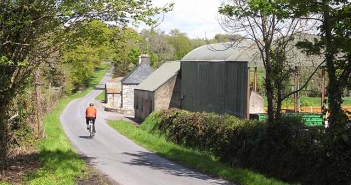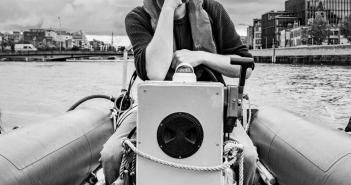In Dante Alighieri’s The Divine Comedy (1320) we encounter a forlorn Ulysses (Greek, Odysseus) in the Inferno, punished to eternal torments for deceitful stratagems in the Trojan war, and beyond. Dante adds a layer to the Classical myth, where the aged warrior returns to his native Ithaca only to find:
not sweetness of a son, not reverence
for an ageing father, not the debt of love
I owed Penelope to make her happy
could quench deep in myself the burning wish
to know the world and have experience
of all man’s vices, of all human worth.
He persuades his crew to embark on a final voyage to a: ‘world they called unpeopled’. For five months they sail until, ‘there appeared a mountain shape, darkened / by distance, that arose to endless heights,’ which is the mount of Purgatory. But, ‘celebrations soon turned into grief,’ as a whirlwind wrecks the fleet, consigning Odysseus and his crew to a watery grave. A hero, who dared travel beyond accepted limitations, is doomed to an excruciating hell, even if there is a suspicion that Dante admires his chutzpah for seeking to experience “all human worth.”[i]
Fear of the sea is an intuitive recognition of the danger it poses, in contrast to an attachment to home ground. As Herman Melville in Moby Dick (1851) puts it: ‘For as this appalling ocean surrounds the verdant land, so in the soul of man there lies one insular Tahiti, full of peace and joy, but encompassed by all the horrors of the half known life. God keep thee! Push not from that isle, thou canst never return!’[ii]
Odysseus’s sorry fate also reflects a medieval mindset that looked askance at unfettered ambition. This devolved into superstitions deterring voyages to unchartered territories. Thus Laurens van der Post relates a story told to him by Carl Jung, ‘that if one wanted to fix a precise moment at which the Renaissance began, it would be the day when the Italian poet Petrarch decided to defy superstition and climbed a mountain in the Alps, just for the sake of reaching its summit.’[iii] Through a rebirth in Classical ideas that followed in Petrarch’s wake, Europeans opened their eyes to hidden possibilities, leading to the discovery of new continents that relied on a spirit of innovation.
Poetic Inspiration
Poetry in its widest sense is a font of ingenuity and invention. Thus Andre Breton in his Surrealist Manifesto saw it as: ‘Dictated by the thought, in the absence of any control exercised by reason, exempt from any aesthetic or moral concern.’ Reversing a dictum attributed to Stalin describing poets as engineers of the human soul, Breton attributes scientific breakthroughs to a poetic imagination, arguing: ‘the conquests of science rest far more on a surrealistic than on a logical thinking.’[iv]
This reinforces Percy Shelley’s proposition that poets, operating in varying capacities, are the ‘unacknowledged legislators of the world.’ The spark for any new venture comes from an imagination Shelley equates with poetry. He distinguishes this faculty from reason, which he describes as the ‘enumeration of qualities already known’; whereas ‘imagination in the perception of the values of those qualities, both separately and as a whole … Reason is to imagination as the instrument to the agent, as the body to the spirit, as the shadow to the substance.’[v]
Too often governments, corporations and individuals inhibit that poetic ignition. Across society we see reason and logic in constant motion, but imagination is barely nurtured, and often frowned on. We proceed from point A to B, all too often ignoring possibilities arising in the remainder of the alphabet. Yet scientific innovation is predicated on poetically imagining possibilities beyond contemporary restraints. It is notable that, besides his contributions to the understanding of the physical universe, Albert Einstein was a prolific poet.
Technological advances have diminished our intuitive fear of the ocean. As Melville put it: ‘however much … man may brag of his science and skill … yet for ever and for ever, to the crack of doom, the sea will insult and murder him … nevertheless, by the continual repetition of these very impressions, man has lost that sense of the full awfulness of the sea which aboriginally belongs to it.’[vi]
Incontestably, a combination of greed and frightening religious extremism motivated the global exploration of the sixteenth century, which rapidly encompassed the whole Earth. But the first voyagers also displayed admirable qualities, including a willingness to set aside a fear of the unknown, the strange and exotic.
Crossing great stretches of ocean demanded breakthroughs in nautical engineering, including the development of a lighter, more mobile, craft, the caravel. Developed in Portugal under Henry the Navigator (d.1460), this vessel could sail into a head wind. Such innovations occurred because adventurous spirits imagined pathways previously considered taboo. It is only by taking such imaginative flights, overcoming prejudices and applying the required labour, that new inventions are realised.
Despite the ensuing carnage and destruction of natural environments wrought by European colonisation, there remains an enduring heroism in this original repudiation of orthodoxy. In Dante’s Inferno Odysseus did founder, but we may laud a spirit rejecting preconceived limitations that a medieval mind considered hubristic. Innovation demands an interrogation of established ideas, a rejection of preconception and the embrace of the unknown – like a bird taking flight for the first time in its evolution. How did that feel?
The Great Adventure of Our Time
Theodore Zeldin recently considered what the great adventure of our time should be: if in the sixteenth century it was discovering new continents; and scientific enquiry in the seventeenth; or addressing political equality in the eighteenth. Precisely the most valuable quest in our time remained elusive to him, but he argued that giving a new meaning to work could offer a great adventure: ‘so that it is more than the exercise of a valued skill, more than the enjoyment of collaboration with others, more than a price that has to be paid in search of security and status, means using work to redefine freedom.’[vii]
A revolution in working practices does seem overdue, with technology performing most basic and increasingly complex tasks. A new departure in attitudes to employment should also appeal to anyone disheartened by the irrationality of boundless economic growth. Any new economy ought to harness creativity in different domains, and address the tendency towards homogenisation of large corporations. Still, I fear this aspiration to alter work practices is insufficiently ambitious for the environmental challenges of the twenty-first century, in the shape of runaway climate change and a Sixth Extinction.
Previously Naomi Klein has pointed a finger at unbridled capitalism,[viii] but simply achieving a more equitable distribution of wealth appears insufficient. Historically at least, socialism has been defined in materialistic terms, apportioning needs within a hierarchy that continues to inflate. There is a moral obligation to furnish all humans with basic necessities yes, but we must also enter into a harmonious relationship with the natural world, which, thus far, most political ideologies and organised religions have failed adequately to take account of. Within an altered ethical framework, encompassing an idea of Wild Law that I have previously expounded on, necessity will be the mother of invention of the tools required for favourable adaptations.
‘By nature free’
We are in Milton’s words from Paradise Lost (1667): ‘By nature free, not overruled by fate’, but each individual vessel still faces ruin unless we tame the raging waters of our collective acquisitiveness. We require an Age of Empathy elevating symbiosis and cooperation. Thus according to Gandhi: ‘Man is not born to live in isolation but is essentially a social animal independent and interdependent. No one should ride on another’s back.’[ix]
If we continue to gorge ourselves on the world’s resources – failing to acknowledge the limit of natural capital – we confront death and destruction on an unimaginable scale. Let us hope it does not take another Flood of Biblical proportions to awaken us to this reality. Alas, a shock to the global system seems necessary to shake us out of our collective stupor. We must face up to what the future holds, and aggressively confront sinister and self-serving conspiracy theories.
The field of science – a term only coined in the 1830s the field having previously been referred to as natural philosophy – alone cannot convey the world as it will appear in the decades to come if we continue on our present course. The arts play a vital role in conveying the apocalyptic scenes awaiting. Science fiction has long plotted dystopian scenarios – going back to Mary Shelley’s The Last Man (1826) – and this vision is entering the mainstream of literature.
In Cormac McCarthy’s The Road (2006) a father and son wander through an apocalyptic landscape denied the sun’s live-giving rays. Cannibalism is rife as the last humans compete with one another. In the final paragraph there is a mesmerising ode to a lost Nature:
Once there were brook trout in the streams in the mountains. You could see them standing in the amber current where the white edges of their fins wimpled softly in the flow. They smelled of moss in your hand. Polished and muscular and torsional. On their backs were vermiculate patterns that were maps of the world in its becoming. Maps and mazes. Of a thing which could not be put back. Not to be made right again. In the deep glens where they lived all things were older than man and they hummed of mystery.[x]
Verily a Paradise Lost.
Harsh Realities
When we face up to harsh realities a change in outlook can occur. Laurens van der Post writes:
It was only when man looked death full in the face that the mortality which is imminent in the final regard releases him from all excess in his proportions, and in the surrender of egotistical presumption which follows as night in the day, unlocks him for the experience of compassion for all living things, ‘from ant to Emperor, whale to cat’, as the Buddhists of Tibet put it, which is the sign of his conscious return from exile to the all-belonging, which has been his point of departure and is then his Home. [xi]
Humans are capable of mind-boggling cruelty and selfishness but within our spectrum we possess staggering levels of empathy and compassion. These diverging characteristics may even co-exist in the same person.
I propose that the great adventure of this epoch lies in the way we relate to Nature, which is all life on Earth, including ourselves. The challenge, as I see it, is to ground ourselves within that diverse ecology rather than placing ourselves above other forms of life, as the Western philosophic tradition has purported to do so. Thus Plato formatively established a hierarchy of beings in his Timaeus (c.360 BCE), proceeding from men at the top down through women to the ‘lower’ animals. Somewhat comically he compares other animals unfavourably to human beings:
The race of birds was produced by a process of transformation, whereby feathers grew instead of hair, from harmless empty-headed men, who were interested in the heavens but were silly enough to think that the most certain astronomical demonstrations proceed through observation. Wild land animals have come from men who made no use of philosophy and never in any way considered the nature of the heavens because they had ceased to use the circles in the head and followed the leadership of the parts in the soul in the breast.[xii]
Unfortunately, the lasting impression Plato has made on Western culture with these ideas has been no laughing matter.
Sentience
Widening the circle of empathy brings us into communion with all living beings. Even plant life deserves reverence. In Peter Wohlleben’s The Hidden Life of Trees[xiii] we discover remarkable species, displaying unaccounted for intelligences. Trees communicate with one another using an array of languages including scent from blossoms, and via electrical signals that travel at a third of an inch per minute. This allows them to warn neighbours if they are under attack. Chemical signals are also passed via fungal networks around root tips, a so-called ‘wood wide web.’
Moreover, the ability of plants to learn from external stimuli has been exhibited in Dr Monica Gagliano’s experiments on the sensitivity of the mimosa plant. Gagliano released individual drops of water on the plant’s foliage at regular intervals. At first the anxious plants instantly closed their leaves, mistaking the single droplets for the onset of heavy rainfall. After a number of false alarms, however, the plants recognised these to be harmless and kept their leaves open. Remarkably, the small plants learnt from the experience, applying the lessons weeks later.[xiv]
Thus, in consuming any plant we should be mindful of all its complexity, and prize agricultural systems that permits a wide diversity of life to co-exist. Nonetheless, plant life can be distinguished from animal in terms of sentience: which is the capacity to feel, perceive, or experience subjectively. Essentially, we know that other animals feel pain – both physical and psychological – via central nervous systems similar to our own. The precise boundaries between plant and animal life may be frayed, but the evidence for pain in other animals is unmistakable.
Factory farming may soon be viewed as among the worst crimes in human history. The food writer Michael Pollan referred to a Concentrated Animal Feeding Operation (CAFO) he visited as, ‘a place I won’t soon forget: a deep circle of porcine hell.’ In a display of cognitive dissonance he acknowledges the pork sandwich he eats is ‘underwritten by the most brutal kind of agriculture.’ At least he quotes Ralph Waldo Emerson to the effect that ‘however scrupulously the slaughterhouse is concealed in the graceful distance of miles, there is complicity.’[xv]
The effect of animal domestication, especially grazing ruminants and the cultivation of foodstuffs for their consumption, also has a devastating effect on surviving free animals, compelled to make way for a vast expansion of agriculture around the globe. Astonishingly, today humans, our livestock (and pets) account for ninety-six percent of the Earth’s total land vertebrate biomass.[xvi] This has all occurred alongside immeasurable devastation to the plant kingdom.
It is futile to read a philosophy of veganism back through human history to condemn ancestors who often killed animals for survival – or even to focus on those remaining hunter-gatherer communities living in remote and inhospitable regions. But in Western societies, at least, there are a multitude of healthful and tasty alternatives to animal products, displaying great qualities of human inventiveness in the gastronomic field. We are not obligate carnivores, unlike our near relative homo neanderthalensis that seems to have gone extinct for this reason.[xvii] A global food chain now allows us to overcome seasonal shortages and localized crop failures to provide a nutritious plant-based-diet-for-all.
New Departure
In his biographic account of hunting whales on board a Norwegian vessel in the 1920s Laurens van der Post, recites an extraordinary statement on the new departure he considered necessary in our relationship to the natural world:
I could not deny the excitement and acceleration into a consummation of archaic joy which the process of stalking and hunting, even at sea, had invoked in me, although I was at present now only as an observer. On the other hand, hard on these emotions, came an equal and opposite revulsion which nearly overwhelmed me when the hunt, as now, was successful and one was faced with the acceptance of the fact that one had aided and abetted in an act of murder of such a unique manifestation of creation. The only dispensation of the paradox ever granted to me in the past, unaware as I had been of the immensity of it until revealed to me in this moment at sea, was that in hunting out of necessity, all revulsions were redeemed by the satisfaction one felt in bringing food home to the hungry. That such satisfaction was not an illusion, nor a form of special pleading in the court of natural conscience, was proved to me by the profound feeling of gratitude one invariably felt for the animal that had died in order for others to live … [but]what could this possibly have to do with the necessities which were essential for the redemption of the act of killing … in this increasingly technological moment of my youth, when control of life was passing more and more from nature to man, and when there were already available all sorts of artificial substitutes for the essential oils which animals like the whale had once been the only source of supply, what, I asked myself bitterly, could justify such killing except the greed of man for money … Worse still, I was certain that our imperviousness to the consternation caused by such killing in the heart of the nature could be the beginning of an enmity between man and the life which had brought him forth that could imperil his future on earth itself.[xviii]
Dietary change may indeed be relevant to the wider transformation of the human person. The legendary gastronome Jean Anthelme Brillat-Savarin’s maxim ‘Tell me what you eat and I will tell you what you are,’ perhaps overstates the argument, yet the constituents of a diet do exert a profound influence on minds inseparable from bodies. This is ingrained in almost every spiritual tradition, even Christianity. Thus in Western monasticism, going back to the Early Church Fathers and the Rule of St. Benedict, consumption of animal products was considered incompatible with a life of meditation and prayer.
We are a product of the air we breathe, the fluids we imbibe and the bacteria with which we co-exist, our genetic programming, and perhaps morphic resonances, whereby self-organising systems inherit a memory from previous similar systems.[xix] Nonetheless, the vast complexity of food at our disposal makes this arguably the leading variable in that process of growth and atrophy characterising life as we know it.
Humanity today utilises a mere six hundred out of the hundreds of thousands of edible plants that exist on Earth.[xx] This vast, unrealised potential of unnurtured crop varieties mean we are only skimming the surface of agricultural possibilities, with dramatic implications for the environments that we manage. Untapped potential may also lies in the cultivation of bacteria, that could be conditioned to taste like familiar foodstuffs, including meat. George Monbiot recently argued that lab-grown food could save the planet,[xxi] albeit these technologies are still in their infancy. What we now require is an alliance of farmers, chefs, scientists and gastronomes, unbound by convention, to imagine new possibilities in a Fourth Agricultural Revolution.
Theodore Zeldin is right to say that: ‘The invention of a new dish is an act of freedom, small but not insignificant.’[xxii] We can all play a part in this great adventure.
An altered relationship with Nature would be a revolution unlike any other in human history, and it is surely essential for this to occur in the Anthropocene, our current geological age of human impacts, where the accumulated bones of domesticated chickens are a sign of our overweening presence, along with nuclear residues, and climate chaos. Aside from any ethical stance, ecological limits are in sight: we cannot continue slaughtering over fifty billion domesticated animals each year for food.
Vegan Diet
As Jiddu Krishnamurti puts it: ‘We haven’t time to fool around anymore – the house is on fire.’[xxiii] The world’s population now stands at over seven billion. At the beginning of the last century we were a mere one and a half billion, with a far shorter life span than today, leading lives far less exacting on the planet’s resources. We have since applied science to the manufacture of all manner of conveniences, culminating in a global obesity pandemic and giant plastic graveyards in the Pacific Ocean. We have waged a relentless war on the natural world that sees no sign of abating. Since the 1970s, when I was born, 60% of all mammal species have gone extinct,[xxiv] mainly through a loss of habitat intimately connected to the foods we eat.
Scientists are devoting their imaginative faculties to the realisation of a carbon-diminished future, but environmental morality should not be reduced to an exercise in carbon accounting. I would argue that the single most transformative step any person can take in their life is to embrace a vegan philosophy, which entails a cooperative rather than exploitative relationship with Nature. And if you should fail initially, try and try again.
Projected population growth over the coming decades makes meat consumption even more unsustainable, leading to further, horrific ‘efficiencies’ in factory farming. The whole edifice of animal agriculture ought to crumble, perhaps bringing an expansion in human consciousness. Thus Charles Darwin argues that the history of man’s moral development has been a continual extension of the objects of his ‘social instincts’ and ‘sympathies’ writing:
Originally each man had regard only for himself and those of a very narrow circle about him; later he came to regard more and more not only, the welfare, but the happiness of all his fellow men; then his sympathies became more tender and widely diffused, extending to men of all races, to the imbecile, maimed and other useless members of society, and finally to the lower animals.[xxv]
Tennyson’s ‘Ulysses’
Five hundred years after Dante’s Divine Comedy in 1833 Alfred Lord Tennyson published his poem ‘Ulysses’, where he develops the epic tale of Odysseus further. Again we find a frustrated Odysseus in Ithaca before a final voyage bemoaning:
How dull it is to pause, to make an end,
To rust unburnished, not to shine in use!’
To follow knowledge like a sinking star,
Beyond the utmost bound of human thought.
In the spirit of his age of expansion Tennyson hails an ambition ‘to strive, to seek, to find, and not to yield,’ and so might we adopt such an approach to confront impending environmental crises. As a species we are entering unknown and decidedly choppy waters, and now require imaginative capacities to take flight. This is an ominous, but ultimately heroic quest that requires us to cross new moral frontiers.
[i] Dante Alighieri The Divine Comedy, Inferno, Mark Musa (Translator), New York, Penguin, 2003, Canto 26
[ii] Herman Melville, Moby Dick, Wordsworth Classics, London, 1992 p.262
[iii] Laurens van der Post, Yet Being Someone Other, The Hogarth Press, London, 1982, p.18
[iv] MANIFESTO OF SURREALISM BY ANDRÉ BRETON, 1924.
[v] Percy Bysshe Shelley, ‘A Defence of Poetry’ (1821)
[vi] Melville, 1992, p,261
[vii] Theodore Zeldin, The Hidden Pleasures of Life: A New Way of Remembering the Past and Imagining the Future, MacLehose Press, London, p.313
[viii] Naomi Klein This Changes Everything: Capitalism vs. the Climate, Simon and Schuster, New York, 2014.
[ix] Anthony Parel, Gandhi, Freedom and Self-Rule, Lexington Books, London, 2000, Washington, p.109
[x] Cormac McCarthy, The Road, Alfred A. Knopf, New York, p.287
[xi] van der Post, 1992 p.223
[xii] Plato, Timaeus and Critias, translated by Benjamin Jowett, Penguin Classics, London, 2008, p.90
[xiii] Peter Wohlleben, The Hidden Life of Trees, Jane Billinghurst (translator), Black Inc., Carlton, 2016
[xiv] Monica Gagliano, Thus Spoke the Plant, North Atlantic Books, New York, 2018
[xv] Michael Pollan, Cooked – A Natural History of Transformation, Penguin, New York, pp.49-51
[xvi] Olivia Rosane, ‘Humans and Big Ag Livestock Now Account for 96 Percent of Mammal Biomass’, EcoWatch, 2018, https://www.ecowatch.com/biomass-humans-animals-2571413930.html
[xvii] Tim Flannery, Europe – A Natural History, Allen Lane, London, 2018, p.177
[xviii] van der Post, 1982, p.88
[xix] Rupert Sheldrake, https://www.sheldrake.org/research/morphic-resonance
[xx] Theodore Zeldin, An Intimate History of Humanity, Harper Perennial, London, 1994, p.93
[xxi] George Monbiot, ‘Lab-grown food will soon destroy farming – and save the planet’, The Guardian, January 8th, 2020, https://www.theguardian.com/commentisfree/2020/jan/08/lab-grown-food-destroy-farming-save-planet
[xxii] Zeldin, 1994, p.94
[xxiii] Jiddu Krishnamurti, ‘Knowledge and the transformation of man,’ https://jkrishnamurti.org/content/knowledge-and-transformation-man
[xxiv] Damian Carrington, ‘Humanity has wiped out 60% of animal populations since 1970, report finds’, The Guardian, October 30th, 2018, https://www.theguardian.com/environment/2018/oct/30/humanity-wiped-out-animals-since-1970-major-report-finds
[xxv] From The Descent of Man.




